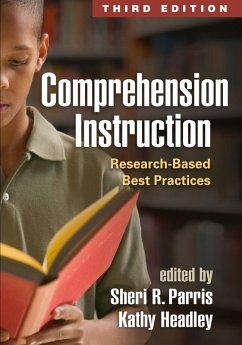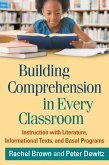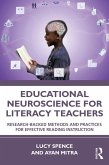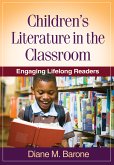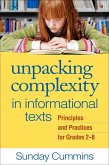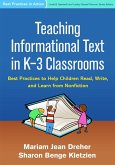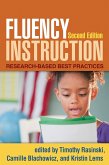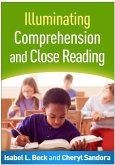Comprehension Instruction (eBook, ePUB)
Research-Based Best Practices
Redaktion: Parris, Sheri R.; Headley, Kathy
47,95 €
47,95 €
inkl. MwSt.
Sofort per Download lieferbar

24 °P sammeln
47,95 €
Als Download kaufen

47,95 €
inkl. MwSt.
Sofort per Download lieferbar

24 °P sammeln
Jetzt verschenken
Alle Infos zum eBook verschenken
47,95 €
inkl. MwSt.
Sofort per Download lieferbar
Alle Infos zum eBook verschenken

24 °P sammeln
Comprehension Instruction (eBook, ePUB)
Research-Based Best Practices
Redaktion: Parris, Sheri R.; Headley, Kathy
- Format: ePub
- Merkliste
- Auf die Merkliste
- Bewerten Bewerten
- Teilen
- Produkt teilen
- Produkterinnerung
- Produkterinnerung

Bitte loggen Sie sich zunächst in Ihr Kundenkonto ein oder registrieren Sie sich bei
bücher.de, um das eBook-Abo tolino select nutzen zu können.
Hier können Sie sich einloggen
Hier können Sie sich einloggen
Sie sind bereits eingeloggt. Klicken Sie auf 2. tolino select Abo, um fortzufahren.

Bitte loggen Sie sich zunächst in Ihr Kundenkonto ein oder registrieren Sie sich bei bücher.de, um das eBook-Abo tolino select nutzen zu können.
All key issues of research and practice in comprehension instruction are addressed in this highly regarded professional resource and course text. Leading scholars examine the processes that enable students to make meaning from what they read--and how this knowledge can be applied to improve teaching at all grade levels. Best practices for meeting the needs of diverse elementary and secondary students are identified. Essential topics include strategies for comprehending different types of texts, the impact of the Common Core State Standards (CCSS), cutting-edge assessment approaches, and the…mehr
- Geräte: eReader
- ohne Kopierschutz
- eBook Hilfe
Andere Kunden interessierten sich auch für
![Building Comprehension in Every Classroom (eBook, ePUB) Building Comprehension in Every Classroom (eBook, ePUB)]() Rachel BrownBuilding Comprehension in Every Classroom (eBook, ePUB)34,95 €
Rachel BrownBuilding Comprehension in Every Classroom (eBook, ePUB)34,95 €![Educational Neuroscience for Literacy Teachers (eBook, ePUB) Educational Neuroscience for Literacy Teachers (eBook, ePUB)]() Lucy SpenceEducational Neuroscience for Literacy Teachers (eBook, ePUB)42,95 €
Lucy SpenceEducational Neuroscience for Literacy Teachers (eBook, ePUB)42,95 €![Children's Literature in the Classroom (eBook, ePUB) Children's Literature in the Classroom (eBook, ePUB)]() Diane M. BaroneChildren's Literature in the Classroom (eBook, ePUB)27,95 €
Diane M. BaroneChildren's Literature in the Classroom (eBook, ePUB)27,95 €![Unpacking Complexity in Informational Texts (eBook, ePUB) Unpacking Complexity in Informational Texts (eBook, ePUB)]() Sunday CumminsUnpacking Complexity in Informational Texts (eBook, ePUB)27,95 €
Sunday CumminsUnpacking Complexity in Informational Texts (eBook, ePUB)27,95 €![Teaching Informational Text in K-3 Classrooms (eBook, ePUB) Teaching Informational Text in K-3 Classrooms (eBook, ePUB)]() Mariam Jean DreherTeaching Informational Text in K-3 Classrooms (eBook, ePUB)27,95 €
Mariam Jean DreherTeaching Informational Text in K-3 Classrooms (eBook, ePUB)27,95 €![Fluency Instruction (eBook, ePUB) Fluency Instruction (eBook, ePUB)]() Fluency Instruction (eBook, ePUB)42,95 €
Fluency Instruction (eBook, ePUB)42,95 €![Illuminating Comprehension and Close Reading (eBook, ePUB) Illuminating Comprehension and Close Reading (eBook, ePUB)]() Isabel L. BeckIlluminating Comprehension and Close Reading (eBook, ePUB)34,95 €
Isabel L. BeckIlluminating Comprehension and Close Reading (eBook, ePUB)34,95 €-
-
-
All key issues of research and practice in comprehension instruction are addressed in this highly regarded professional resource and course text. Leading scholars examine the processes that enable students to make meaning from what they read--and how this knowledge can be applied to improve teaching at all grade levels. Best practices for meeting the needs of diverse elementary and secondary students are identified. Essential topics include strategies for comprehending different types of texts, the impact of the Common Core State Standards (CCSS), cutting-edge assessment approaches, and the growing importance of digital genres and multimodal literacies. User-friendly features include end-of-chapter discussion questions.
New to This Edition
*Incorporates the latest research and instructional practices.
*Chapters on the CCSS, critical theory, culturally responsive instruction, and response to intervention.
*Chapters on teaching fiction and informational texts in the secondary grades.
*Expanded coverage of multimodal literacy learning.
*Timely topics such as text complexity, close reading, digital literacies, and neuroscience are discussed in multiple chapters.
New to This Edition
*Incorporates the latest research and instructional practices.
*Chapters on the CCSS, critical theory, culturally responsive instruction, and response to intervention.
*Chapters on teaching fiction and informational texts in the secondary grades.
*Expanded coverage of multimodal literacy learning.
*Timely topics such as text complexity, close reading, digital literacies, and neuroscience are discussed in multiple chapters.
Dieser Download kann aus rechtlichen Gründen nur mit Rechnungsadresse in A, D ausgeliefert werden.
Produktdetails
- Produktdetails
- Verlag: Guilford Publications
- Seitenzahl: 418
- Erscheinungstermin: 19. Juni 2015
- Englisch
- ISBN-13: 9781462520817
- Artikelnr.: 47978387
- Verlag: Guilford Publications
- Seitenzahl: 418
- Erscheinungstermin: 19. Juni 2015
- Englisch
- ISBN-13: 9781462520817
- Artikelnr.: 47978387
- Herstellerkennzeichnung Die Herstellerinformationen sind derzeit nicht verfügbar.
Sheri R. Parris, PhD, is an Associate Research Scientist with the Institute of Child Development at Texas Christian University and Adjunct Professor in the Master of Education program at Concordia University Texas. Previously, she was a high school English language arts teacher and a middle school computer literacy teacher, and held a variety of educational research positions. Dr. Parris's areas of expertise include reading comprehension, adolescent literacy, and neuroscience as it relates to literacy, learning, and child development, with an emphasis on at-risk populations. She has coauthored numerous book chapters and journal articles. Kathy Headley, EdD, is Associate Dean for Research and Graduate Studies in the College of Health, Education, and Human Development and Professor of Literacy in the Eugene T. Moore School of Education at Clemson University. Dr. Headley began her career as a teacher and reading specialist in Georgia. Her areas of expertise include adolescent literacy and writing, with specialized interests in comprehension and vocabulary. She has published articles in leading literacy journals and served on the Board of Directors of the International Reading Association.
Introduction, Sheri R. Parris and Kathy Headley
I. Comprehension Instruction within Theoretical Frameworks
1. Beyond Borders: A Global Perspective on Reading Comprehension, Sheri R.
Parris, Linda B. Gambrell, and Andreas Schleicher
2. Comprehension Instruction from a Critical Theory Viewpoint, Bogum Yoon
3. Using Inquiry Dialogue to Promote the Development of Argument Skills:
Possibilities, Challenges, and New Directions, Alina Reznitskaya, Judy
Yu-Li Hsu, and Richard C. Anderson
4. Reading Comprehension, Embodied Cognition, and Dual Coding Theory, Mark
Sadoski
5. Executive Function and Reading Comprehension: The Critical Role of
Cognitive Flexibility, Kelly B. Cartwright
6. Metacognition in Comprehension Instruction: New Directions, Linda Baker,
Laura U. DeWyngaert, and Alisa Zeliger-Kandasamy
7. Constructivist Theory as a Framework for Instruction and Assessment of
Reading Comprehension, Donna Caccamise, Angela Friend, Megan K.
Littrell-Baez, and Eileen Kintsch
II. Comprehension Instruction Contexts
8. Comprehension Instruction within the Context of the Common Core, Evelyn
Ford-Connors, Dana A. Robertson, Christine Leighton, Jeanne R. Paratore, C.
Patrick Proctor, and Michelle Carney
9. Using Neuroscience to Inform Comprehension Instruction, Sheri R. Parris
and Cathy Collins Block
10. Comprehension Instruction in Culturally Responsive Classrooms: A Review
of Research and Practice, Ellen McIntyre
11. New Insights on Motivation in the Literacy Classroom, Jacquelynn A.
Malloy
12. Research on Response-to-Intervention Supplemental Interventions:
Where's the Comprehension Instruction?, Deborah MacPhee, Elizabeth Bemiss,
and Diane Stephens
13. Comprehension Instruction for At-Risk Students, Irma F. Brasseur-Hock,
Michael F. Hock, and Donald D. Deshler
14. Comprehension Instruction for English Language Learners: New
Perspectives, New Challenges, Robert Rueda, Norman J. Unrau, and Elena Son
III. Comprehension Instruction in Action
15. Best Practices for Comprehension Instruction in the Elementary
Classroom, Nell K. Duke and Nicole M. Martin
16. Fiction Comprehension Instruction: Attending to Characters' and
Readers' Emotional States, Laura B. Smolkin and Erin M. McTigue
17. Improving Comprehension of Informational Texts in the Elementary
Classroom, Lisa S. Pao and Joanna P. Williams
18. Best Practices for Comprehension Instruction in the Secondary
Classroom, Douglas Fisher and Nancy Frey
19. Improving Comprehension of Fictional Texts in the Secondary Classroom,
Tiffany Ohlson, Heather Monroe-Ossi, and Sheri R. Parris
20. Improving Comprehension of Informational Texts in the Secondary
Classroom, Vicki A. Jacobs and Jacy Ippolito
IV. Multimodal Literacies and Comprehension
21. Multimodal Literacy: Best Practices for Comprehension Instruction,
Sally Lamping
22. Beyond Differentiation: Multimodal Literacy Learning, B. P. Laster
23. Research on Instruction and Assessment in the New Literacies of Online
Reading Comprehension, Jill Castek, Julie Coiro, Laurie A. Henry, Donald J.
Leu, and Douglas K. Hartman
24. Reading Digital: Designing and Teaching with eBooks and Digital Text,
Bridget Dalton and David Rose
25. Games and Comprehension: The Importance of Specialist Language, James
Paul Gee
26. New Literacies and Comprehension: Resources for Educators, Jan Lacina
27. Summing Up: Putting Comprehension Instruction in Context, Kathy Headley
& Sheri R. Parris
I. Comprehension Instruction within Theoretical Frameworks
1. Beyond Borders: A Global Perspective on Reading Comprehension, Sheri R.
Parris, Linda B. Gambrell, and Andreas Schleicher
2. Comprehension Instruction from a Critical Theory Viewpoint, Bogum Yoon
3. Using Inquiry Dialogue to Promote the Development of Argument Skills:
Possibilities, Challenges, and New Directions, Alina Reznitskaya, Judy
Yu-Li Hsu, and Richard C. Anderson
4. Reading Comprehension, Embodied Cognition, and Dual Coding Theory, Mark
Sadoski
5. Executive Function and Reading Comprehension: The Critical Role of
Cognitive Flexibility, Kelly B. Cartwright
6. Metacognition in Comprehension Instruction: New Directions, Linda Baker,
Laura U. DeWyngaert, and Alisa Zeliger-Kandasamy
7. Constructivist Theory as a Framework for Instruction and Assessment of
Reading Comprehension, Donna Caccamise, Angela Friend, Megan K.
Littrell-Baez, and Eileen Kintsch
II. Comprehension Instruction Contexts
8. Comprehension Instruction within the Context of the Common Core, Evelyn
Ford-Connors, Dana A. Robertson, Christine Leighton, Jeanne R. Paratore, C.
Patrick Proctor, and Michelle Carney
9. Using Neuroscience to Inform Comprehension Instruction, Sheri R. Parris
and Cathy Collins Block
10. Comprehension Instruction in Culturally Responsive Classrooms: A Review
of Research and Practice, Ellen McIntyre
11. New Insights on Motivation in the Literacy Classroom, Jacquelynn A.
Malloy
12. Research on Response-to-Intervention Supplemental Interventions:
Where's the Comprehension Instruction?, Deborah MacPhee, Elizabeth Bemiss,
and Diane Stephens
13. Comprehension Instruction for At-Risk Students, Irma F. Brasseur-Hock,
Michael F. Hock, and Donald D. Deshler
14. Comprehension Instruction for English Language Learners: New
Perspectives, New Challenges, Robert Rueda, Norman J. Unrau, and Elena Son
III. Comprehension Instruction in Action
15. Best Practices for Comprehension Instruction in the Elementary
Classroom, Nell K. Duke and Nicole M. Martin
16. Fiction Comprehension Instruction: Attending to Characters' and
Readers' Emotional States, Laura B. Smolkin and Erin M. McTigue
17. Improving Comprehension of Informational Texts in the Elementary
Classroom, Lisa S. Pao and Joanna P. Williams
18. Best Practices for Comprehension Instruction in the Secondary
Classroom, Douglas Fisher and Nancy Frey
19. Improving Comprehension of Fictional Texts in the Secondary Classroom,
Tiffany Ohlson, Heather Monroe-Ossi, and Sheri R. Parris
20. Improving Comprehension of Informational Texts in the Secondary
Classroom, Vicki A. Jacobs and Jacy Ippolito
IV. Multimodal Literacies and Comprehension
21. Multimodal Literacy: Best Practices for Comprehension Instruction,
Sally Lamping
22. Beyond Differentiation: Multimodal Literacy Learning, B. P. Laster
23. Research on Instruction and Assessment in the New Literacies of Online
Reading Comprehension, Jill Castek, Julie Coiro, Laurie A. Henry, Donald J.
Leu, and Douglas K. Hartman
24. Reading Digital: Designing and Teaching with eBooks and Digital Text,
Bridget Dalton and David Rose
25. Games and Comprehension: The Importance of Specialist Language, James
Paul Gee
26. New Literacies and Comprehension: Resources for Educators, Jan Lacina
27. Summing Up: Putting Comprehension Instruction in Context, Kathy Headley
& Sheri R. Parris
Introduction, Sheri R. Parris and Kathy Headley
I. Comprehension Instruction within Theoretical Frameworks
1. Beyond Borders: A Global Perspective on Reading Comprehension, Sheri R.
Parris, Linda B. Gambrell, and Andreas Schleicher
2. Comprehension Instruction from a Critical Theory Viewpoint, Bogum Yoon
3. Using Inquiry Dialogue to Promote the Development of Argument Skills:
Possibilities, Challenges, and New Directions, Alina Reznitskaya, Judy
Yu-Li Hsu, and Richard C. Anderson
4. Reading Comprehension, Embodied Cognition, and Dual Coding Theory, Mark
Sadoski
5. Executive Function and Reading Comprehension: The Critical Role of
Cognitive Flexibility, Kelly B. Cartwright
6. Metacognition in Comprehension Instruction: New Directions, Linda Baker,
Laura U. DeWyngaert, and Alisa Zeliger-Kandasamy
7. Constructivist Theory as a Framework for Instruction and Assessment of
Reading Comprehension, Donna Caccamise, Angela Friend, Megan K.
Littrell-Baez, and Eileen Kintsch
II. Comprehension Instruction Contexts
8. Comprehension Instruction within the Context of the Common Core, Evelyn
Ford-Connors, Dana A. Robertson, Christine Leighton, Jeanne R. Paratore, C.
Patrick Proctor, and Michelle Carney
9. Using Neuroscience to Inform Comprehension Instruction, Sheri R. Parris
and Cathy Collins Block
10. Comprehension Instruction in Culturally Responsive Classrooms: A Review
of Research and Practice, Ellen McIntyre
11. New Insights on Motivation in the Literacy Classroom, Jacquelynn A.
Malloy
12. Research on Response-to-Intervention Supplemental Interventions:
Where's the Comprehension Instruction?, Deborah MacPhee, Elizabeth Bemiss,
and Diane Stephens
13. Comprehension Instruction for At-Risk Students, Irma F. Brasseur-Hock,
Michael F. Hock, and Donald D. Deshler
14. Comprehension Instruction for English Language Learners: New
Perspectives, New Challenges, Robert Rueda, Norman J. Unrau, and Elena Son
III. Comprehension Instruction in Action
15. Best Practices for Comprehension Instruction in the Elementary
Classroom, Nell K. Duke and Nicole M. Martin
16. Fiction Comprehension Instruction: Attending to Characters' and
Readers' Emotional States, Laura B. Smolkin and Erin M. McTigue
17. Improving Comprehension of Informational Texts in the Elementary
Classroom, Lisa S. Pao and Joanna P. Williams
18. Best Practices for Comprehension Instruction in the Secondary
Classroom, Douglas Fisher and Nancy Frey
19. Improving Comprehension of Fictional Texts in the Secondary Classroom,
Tiffany Ohlson, Heather Monroe-Ossi, and Sheri R. Parris
20. Improving Comprehension of Informational Texts in the Secondary
Classroom, Vicki A. Jacobs and Jacy Ippolito
IV. Multimodal Literacies and Comprehension
21. Multimodal Literacy: Best Practices for Comprehension Instruction,
Sally Lamping
22. Beyond Differentiation: Multimodal Literacy Learning, B. P. Laster
23. Research on Instruction and Assessment in the New Literacies of Online
Reading Comprehension, Jill Castek, Julie Coiro, Laurie A. Henry, Donald J.
Leu, and Douglas K. Hartman
24. Reading Digital: Designing and Teaching with eBooks and Digital Text,
Bridget Dalton and David Rose
25. Games and Comprehension: The Importance of Specialist Language, James
Paul Gee
26. New Literacies and Comprehension: Resources for Educators, Jan Lacina
27. Summing Up: Putting Comprehension Instruction in Context, Kathy Headley
& Sheri R. Parris
I. Comprehension Instruction within Theoretical Frameworks
1. Beyond Borders: A Global Perspective on Reading Comprehension, Sheri R.
Parris, Linda B. Gambrell, and Andreas Schleicher
2. Comprehension Instruction from a Critical Theory Viewpoint, Bogum Yoon
3. Using Inquiry Dialogue to Promote the Development of Argument Skills:
Possibilities, Challenges, and New Directions, Alina Reznitskaya, Judy
Yu-Li Hsu, and Richard C. Anderson
4. Reading Comprehension, Embodied Cognition, and Dual Coding Theory, Mark
Sadoski
5. Executive Function and Reading Comprehension: The Critical Role of
Cognitive Flexibility, Kelly B. Cartwright
6. Metacognition in Comprehension Instruction: New Directions, Linda Baker,
Laura U. DeWyngaert, and Alisa Zeliger-Kandasamy
7. Constructivist Theory as a Framework for Instruction and Assessment of
Reading Comprehension, Donna Caccamise, Angela Friend, Megan K.
Littrell-Baez, and Eileen Kintsch
II. Comprehension Instruction Contexts
8. Comprehension Instruction within the Context of the Common Core, Evelyn
Ford-Connors, Dana A. Robertson, Christine Leighton, Jeanne R. Paratore, C.
Patrick Proctor, and Michelle Carney
9. Using Neuroscience to Inform Comprehension Instruction, Sheri R. Parris
and Cathy Collins Block
10. Comprehension Instruction in Culturally Responsive Classrooms: A Review
of Research and Practice, Ellen McIntyre
11. New Insights on Motivation in the Literacy Classroom, Jacquelynn A.
Malloy
12. Research on Response-to-Intervention Supplemental Interventions:
Where's the Comprehension Instruction?, Deborah MacPhee, Elizabeth Bemiss,
and Diane Stephens
13. Comprehension Instruction for At-Risk Students, Irma F. Brasseur-Hock,
Michael F. Hock, and Donald D. Deshler
14. Comprehension Instruction for English Language Learners: New
Perspectives, New Challenges, Robert Rueda, Norman J. Unrau, and Elena Son
III. Comprehension Instruction in Action
15. Best Practices for Comprehension Instruction in the Elementary
Classroom, Nell K. Duke and Nicole M. Martin
16. Fiction Comprehension Instruction: Attending to Characters' and
Readers' Emotional States, Laura B. Smolkin and Erin M. McTigue
17. Improving Comprehension of Informational Texts in the Elementary
Classroom, Lisa S. Pao and Joanna P. Williams
18. Best Practices for Comprehension Instruction in the Secondary
Classroom, Douglas Fisher and Nancy Frey
19. Improving Comprehension of Fictional Texts in the Secondary Classroom,
Tiffany Ohlson, Heather Monroe-Ossi, and Sheri R. Parris
20. Improving Comprehension of Informational Texts in the Secondary
Classroom, Vicki A. Jacobs and Jacy Ippolito
IV. Multimodal Literacies and Comprehension
21. Multimodal Literacy: Best Practices for Comprehension Instruction,
Sally Lamping
22. Beyond Differentiation: Multimodal Literacy Learning, B. P. Laster
23. Research on Instruction and Assessment in the New Literacies of Online
Reading Comprehension, Jill Castek, Julie Coiro, Laurie A. Henry, Donald J.
Leu, and Douglas K. Hartman
24. Reading Digital: Designing and Teaching with eBooks and Digital Text,
Bridget Dalton and David Rose
25. Games and Comprehension: The Importance of Specialist Language, James
Paul Gee
26. New Literacies and Comprehension: Resources for Educators, Jan Lacina
27. Summing Up: Putting Comprehension Instruction in Context, Kathy Headley
& Sheri R. Parris
